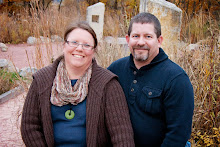We begin the season of Advent tomorrow, the first Sunday in December. One of my families favorite Christmas traditions is a nightly devotional that will last from December 1 to Christmas day. Several years ago our home school support group got together to make a wall hanging of a tree along with 25 flannel pieces that attach to the tree via velcro. Each piece has a picture on it representing a bible verse. We read the bible verse, attach the piece to the tree and sing a Christmas carol. Our children love this and look forward to it every night. They even have most of the verses memorized. This year we added an advent wreath. Each Sunday of December we will light a candle and have a time of reading the scriptures and prayer focused on the coming of Jesus not just as a child but looking forward to his future coming. I am hopeful that this to shall become a loved tradition. I enjoy having traditions. I do not believe that they should be legalistic or replace our faith, but I do believe that traditions help us to focus on our faith. The practice of advent for example helps us to take our focus off of the secular holiday season and instead, narrows our vision onto the birth of Christ.
Noah Webster defined tradition as:
3. That which is handed down from age to age by oral communication. The Jews pay great regard to tradition in matters of religion, as do the Romanists. Protestants reject the authority of tradition in sacred things, and rely only on the written word. Traditions may be good or bad, true or false.
When I refer to tradition I am merely talking about a continuing pattern of beliefs or practices.
Traditions should not replace our faith or be the focus of our faith. Mathew 15 6-9 "This people does me honor with its lips, but its heart is far from me. Their worship is in vain, for the doctrines they teach are the commandments of men.’" Jesus was not condemning all traditions. He condemned only those that made God’s word void. Elsewhere, Jesus instructed his followers to abide by traditions that are not contrary to God’s commandments. "The scribes and the Pharisees sit on Moses’ seat; so practice and observe whatever they tell you, but not what they do; for they preach, but do not practice" (Matt. 23:2–3). What Fundamentalists and Evangelicals often do, unfortunately, is see the word "tradition" in Matthew 15:3 or Colossians 2:8 or elsewhere and conclude that anything termed a "tradition" is to be rejected. They forget that the term is used in a different sense, as in 1 Corinthians 11:2 and 2 Thessalonians 2:15, to describe what should be believed. Jesus did not condemn all traditions; he condemned only erroneous traditions, whether doctrines or practices, that undermined Christian truths. The rest, as the apostles taught, were to be obeyed. Paul commanded the Thessalonians to adhere to all the traditions he had given them, whether oral or written. " Tradition and Scripture
"Some traditions steal the truth rather than amplify it." Mark Holden. The use of tradition to amply truth, to creating a pattern into our lives that helps us to be reminded of those truths is a useful tool. One of the things I have always desired was to study the holidays and feasts of the bible. I am putting that on my to do list for 2008.
skip to main |
skip to sidebar

Where life at home as a wife and a mother can be challenging, inspiring, and lovely.
About Me

- Jasonswife
- midwest, United States
- Its crazy, its wild, its beautiful, its more than I ever imagine and I am thankful to God for each and every day that he gives me to experience this joy. He truly "wrecked my life" and I am loving every moment of it!
Quotes I Love
If we would have a true home, we must gaurd well our thoughts and actions. A single bitter word may disquiet the home for a whole day; but, like unexpected flowers which spring up along our path full of freshness, fragrance and beauty, so do kind worlds, gentle acts and sweet disposition make glad the home where peace and blessing dwell. No matter how humber the abode, if it be thus garnished with grace and sweetened by kindness and smiles, the heart will turn lovingly towards it from all the tumults of the world, and home.
Unknown....
Home sweet home is the sphere of wedded womans mission. To make one such home a sea of holiness and happiness, to fill one such sphere with an influence so sweet and sacred, such an object, such a goal would be deemed by an angel worth an incarnation upon earth.
Unknown....
Home sweet home is the sphere of wedded womans mission. To make one such home a sea of holiness and happiness, to fill one such sphere with an influence so sweet and sacred, such an object, such a goal would be deemed by an angel worth an incarnation upon earth.
John Angle James
